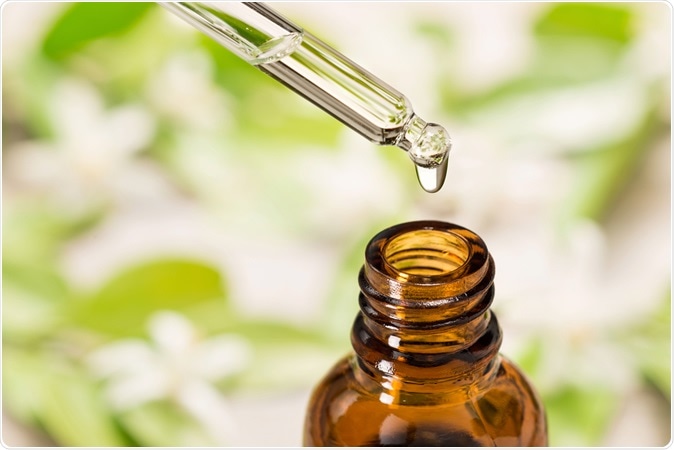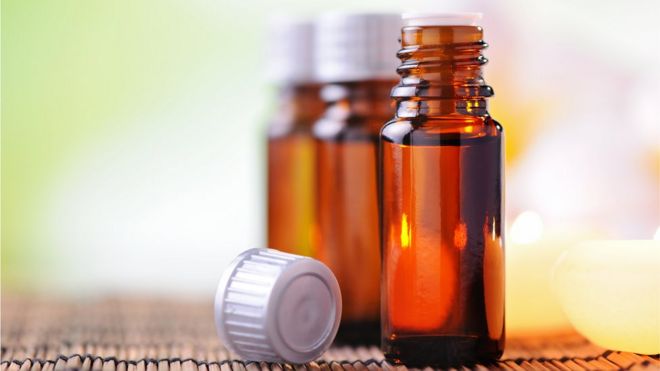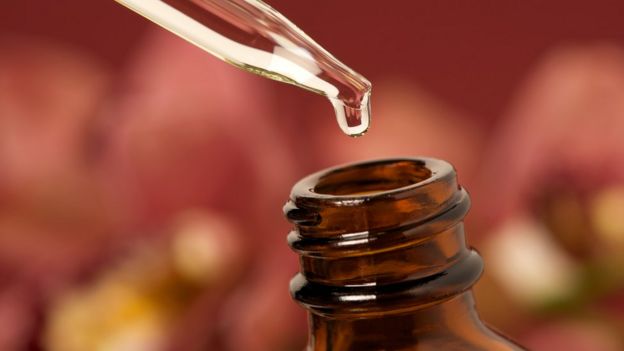A new study has found that essential oils such as lavender and tea tree oils are connected to development of abnormal breast development in young boys. They researchers found eight different chemicals present in these oils that can interfere with hormonal development in boys. The study results are to be presented today (19th of March 2018) at ENDO 2018, the Endocrine Society's 100th annual meeting in Chicago.
March 19, 2018

Image Credit: AmyLv / Shutterstock
Breast development in males is termed as gynaecomastia and this is a condition which has been associated with certain disease conditions and also as a side effect of certain drugs or medications. In many there may be no cause. In general gynecomastia is a rare condition.
The American study now has found that chemicals present in the essential oils can help increase the estrogen or female hormones in the boys and suppress the testosterone or male hormone. This reaction of course is different in different persons.
People use these essential oils directly as well as in daily use products such as lotions, moisturizers, creams, soaps, shampoos, hair styling products etc. Some of these are also used as part of alternative medical procedures. According to J. Tyler Ramsey from the National Institute of Environmental Health Sciences (NIEHS), in North Carolina, who led this new research, use of these oils in any form needs to be with caution among boys. He called these oils “endocrine disruptors” or agents that can alter the hormonal make up and create problems. He said that most of these oils are generally perceived to be safe. He said that there were quite a few reported cases of male gynecomastia after these oils were used over the skin. The symptoms came down once the oils were stopped.
Dr Kenneth Korach, a co-author in this study, has shown in his earlier work that lavender and tea tree oils can affect male characteristics development and puberty and growth among males. This new study looked at the chemicals within these oils. They narrowed it down to eight chemicals out of the hundreds present in these oils. Four of these chemicals are present in both oils. These four are eucalyptol, 4-terpineol, dipentene/limonene and alpha-terpineol. The other four including linalyl acetate, linalool, alpha-terpinene and gamma-terpinene, were in either of the oils.
The team then isolated the chemicals and tested them on human cells within the laboratories. They noted that these chemicals successfully increased estrogen levels and reduced testosterone levels in varying degrees. Ramsey said, these two oils need further study. These eight chemicals are also found in 65 other essential oils he said. These too need thorough investigation before boys are exposed to them.
The U.S. Food and Drug Administration (FDA) approves of the labels on essential oils as GRAS (generally recognized as safe) with usage as directed. This new study from the NIEHS shows that their use maybe with caution especially among pre-pubescent boys.
https://www.news-medical.net/news/20180319/Essential-oils-linked-to-abnormal-breast-development-in-boys.aspx
- - - - - - -
More evidence essential oils 'make male breasts develop'
 GETTY IMAGES
GETTY IMAGES
A suspected link between abnormal breast growth in young boys and the use of lavender and tea tree oils has been given new weight, after a study found eight chemicals contained in the oils interfere with hormones.
Gynaecomastia is rare, and there is often no obvious cause.
But there have been a number of cases linked to use of these essential oils.
The American study found that key chemicals in the oils boost oestrogen and inhibit testosterone.
Not everyone will have the same reaction to an essential oil.
The plant-derived oils are found in a number of products such as soaps, lotions, shampoos and hair-styling products. They're also popular as alternative cleaning products and medical treatments.
Lead researcher J. Tyler Ramsey from the National Institute of Environmental Health Sciences (NIEHS), in North Carolina, suggested caution when using the oils.
"Our society deems essential oils as safe. However, they possess a diverse amount of chemicals and should be used with caution because some of these chemicals are potential endocrine disruptors."
A growing number of reported cases of male gynaecomastia have coincided with topical exposure to the oils.
After they stopped using the products, the symptoms subsided.
A previous study by Dr Kenneth Korach - who was also co-investigator for this study - found that lavender and tea tree oil had properties that competed with or hindered the hormones that control male characteristics, which could affect puberty and growth.
 GETTY IMAGES
GETTY IMAGES
The new study looked at eight key chemicals from the hundreds that make up the oils. Four of the tested chemicals appear in both oils and the others were in either oil.
They were tested on human cancer cells in the laboratory to measure the changes.
The researchers found all eight demonstrated varying degrees of promoting oestrogen and/or inhibiting testosterone properties.
"Lavender oil and tea tree oil pose potential environmental health concerns and should be investigated further," said Mr Ramsey.
Many of the chemicals tested appear in at least 65 other essential oils, which is of concern, he added.

Essential oil guidelines
- Precautions should be observed when using essential oils since they are highly concentrated
- Do not apply undiluted essential oils directly to the skin
- Never use undiluted oils on children under the age of three
- If you are pregnant you should seek the advice of your doctor, midwife before using essential oils
- When used appropriately, essential oils and aromatherapy products are safe for all the family
- Source: Aromatherapy Trade Council

Prof Ieuan Hughes, emeritus professor of paediatrics at the University of Cambridge said the findings "have confirmed why an individual using such oils containing these chemicals may develop breast tissue".
"The anti-male hormone effects are rather unexpected and it is not possible to comment further without the data.
"Of course, not everyone exposing themselves to such oils has adverse effects, so it is possible there are particular individuals who may be more sensitive to the effects of the chemicals, or perhaps are using the products in excess.
He said attention should be given to better regulation of these products.
Prof Hughes added: "Clearly, the longer-term effects of such exposure are unknown."
Dr Rod Mitchell, honorary consultant paediatric endocrinologist at the Queens Medical Research Institute in Edinburgh said the study "is important in establishing a possible mechanism for the suggested link between gynaecomastia and exposure to lavender and tea tree oils".
"However, there are important factors that must be taken into account when interpreting these results. The tests are conducted in cancer cells, which may not represent the situation in normal breast tissue.
"The concentration (dose) to which the cells are exposed may not be equivalent to exposure in humans. There is a complex relationship between oestrogen, testosterone and other hormones in the body, that cannot be replicated in these experiments."
He called for further larger studies.
"At present, there is insufficient evidence to support the concept that exposure to lavender and tea tree oil containing products cause gynaecomastia in children, and further epidemiological and experimental studies are required."
The study results will be presented on 19 March at the Endocrine Society's annual meeting in Chicago.
http://www.bbc.com/news/health-43429933